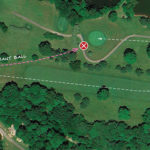Two parents and three teenage children went to a Tennessee mountain resort to claim free zip-line tickets. They were asked if they were interested in the vacation rentals and replied honestly that they only wanted the tickets. The salesman told them that was not a problem, he only needed to drive them to the top of the mountain to fulfill their promotional obligation. He asked if they would mind if his own son rode along since he would start working there soon. They all agreed.
The family visited a mountain resort in exchange for free recreation tickets. Little did they know they were in for the ride of their lives.
The family was led to a golf cart with three rows of seating for six occupants. The salesman weighed over 300 pounds and was the driver with his son seated beside him. The two teenage girls sat in the middle row. The father, mother and their son sat in back row, making a total of seven occupants. The drive was approximately 1.4 miles up a steep and winding mountain road. They climbed to an elevation of 1800 feet then parked to enjoy the scenic view.
Upon returning to the vehicle, the salesman advised his son to always choose a golf cart carefully because the brakes were prone to failure. Moments later while descending a steep curve, the salesman announced that the brakes had gone out. The family thought it was a bad joke, only to realize he was not joking. With several sharp turns and a long descent ahead, the golf cart began gaining excessive speed. The male occupants attempted to slow the vehicle by dragging their feet on the pavement like Fred Flintstone. Their efforts were futile and the father was thrown from the golf cart and suffered serious injuries. Yet, hearing his family screaming in the runaway vehicle, he picked himself up and chased the golf cart on foot with a rush of adrenalin.
Miraculously, the salesman controlled the vehicle all the way down the road until it slowed to a stop at a level area. The family was frantic, fearing the worst had happened to their father. After finding him, he was treated by EMTs and put on a stretcher with neck brace, then taken by ambulance to the hospital. He was treated for serious injuries to his shoulder, arm, leg and eye. His physical recovery took one year and the whole family had reportedly been traumatized.
Architect Michael S. Johnstone was retained as expert witness based on his expertise in golf cart safety and accident analysis. His review of the accident report and witness statements revealed discrepancies in the golf cart model, labeled as a four-seater but having six seats. The year and model did not match the lease agreement. The golf cart also did not appear suited for use on steep mountain roads, lacking basic safety features required on cars.
Moreover, the seven occupants exceeded the vehicle capacity and their combined weight was over its maximum load. Employee records revealed staff were required to drive guests on the property, but the resort offered no details about training for mountain roads and emergency procedures. Drivers were given a safety checklist, but had no way to check brakes or steering other than driving. The checklist also required occupants to wear seat belts, but there were none in the vehicle. Service records for the fleet showed anomalies prior to the accident. Poor communication was found between the resort staff and maintenance company. After the accident, the repair shop was not informed the vehicle suffered brake failure or was involved in severe injury of a guest. The vehicle only received routine maintenance and was placed back into service.
Frequency of golf cart accidents are increasing as more private communities allow golf carts or Low Speed Vehicles (LSV) on open roads. Automobile laws and safety inspections may not apply. Often they simply are not enforced on private property. However, golf courses have specific industry standards regarding vehicles, including vehicle specifications, cart paths, maintenance and accident reporting. This is largely due to the International Light Terrain Vehicle Association (ILTVA), formerly the Golf Cart Manufacturers Association.
Every year, our firm investigates serious golf cart accidents and finds that safety guidelines are typically overlooked. Golf course employees can only follow industry guidelines when demanded by their employer. Accident reports are often specified by insurance companies, but employees receive little to no training how to document them or when to sequester a vehicle for further inspection by an expert.




